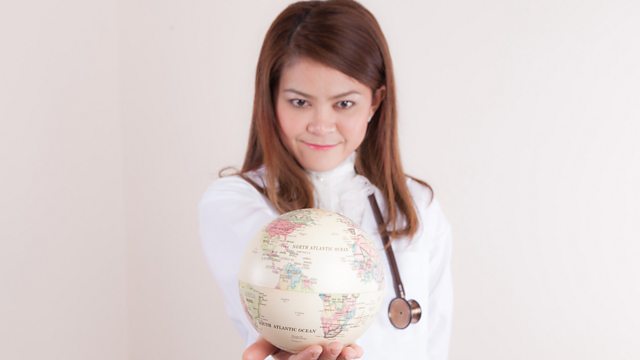
New Global Health Check
New Global Health Check;The Antikythera Mechanism;Kuwait’s Controversial DNA Law;Next steps for human space exploration;A study in spheres;Can sad films raise your pain threshold?
Trying to improve the health of everyone on the planet is the aim of the Sustainable Development Goals or SDGs, which last year replaced the Millennium Development Goals. The first analysis of the SDGs has put places like Iceland and Singapore at the top and war-torn Syria and South Sudan at the bottom. Devi Sridhar, Professor of Global Public Health at the University of Edinburgh, says the targets provide a good basis for planning where to invest scarce resources.
The Antikythera Mechanism and the Ship Wreck
It may sound like the plot of a bad thriller, but it’s a fascinating tale of a 2000 year old shipwreck off the Greek island of Antikythera. Archaeologists have already discovered what they think is the earliest proto- computer – the Antikythera Mechanism – a clockwork device that modelled the motion of the Sun. Other than this, very little is known about the ship and its contents. Now divers have found a leg bone of one of the ship’s passengers. They hope DNA analysis will shed more light on the mystery.
Kuwait’s Controversial DNA Law
Last year, after a terrorist attack, Kuwait passed a law requiring all its citizens, residents and visitors to provide DNA samples, for a National Database. The law is about to be enforced in November, and scientists and human rights advocates argue that there needs to be more clarification and legislation checks and measures to avoid any abuse of an individual’s privacy.
Next Steps for Human Space Exploration
Adam Rutherford talks to astronaut Tim Peake, recently back from the ISS, on where humans should go next in the solar system.
A Study in Spheres
Doctors Adam Rutherford and Hannah Fry investigate ‘why everything in space tends to be circular or spherical?' Hannah gazes at Jupiter at The Royal Observatory, Greenwich with public astronomer, Dr Marek Kukula. Science writer, Philip Ball, explains how the astronomical obsession with celestial spheres came to an untidy end. And, physicist Dr Helen Czerski helps Adam on his quest to find the perfect natural sphere.
Why Can Sad Films Raise Your Pain Threshold?
Having a “good cry” can make us feel better - but what other impact can watching a weepy film have on our bodies? A new study by researchers from Oxford University suggests it also increases our pain threshold. People who watched a sad film had a 13% increase in their tolerance to pain – and they felt more bonded with their fellow audience members.
(Picture: Female doctor showing globe on her hand, Credit: Thinkstock)
The Science Hour was presented by Claudia Hammond with comments from ����ý News science reporter Victoria Gill
Editor: Deborah Cohen
Last on
More episodes
Previous
Broadcasts
- Sat 24 Sep 2016 08:06GMT����ý World Service Australasia
- Sat 24 Sep 2016 22:06GMT����ý World Service except News Internet
- Sun 25 Sep 2016 01:06GMT����ý World Service Australasia
- Mon 26 Sep 2016 05:06GMT����ý World Service South Asia
Podcast
-
![]()
Unexpected Elements
The news you know, the science you don't

